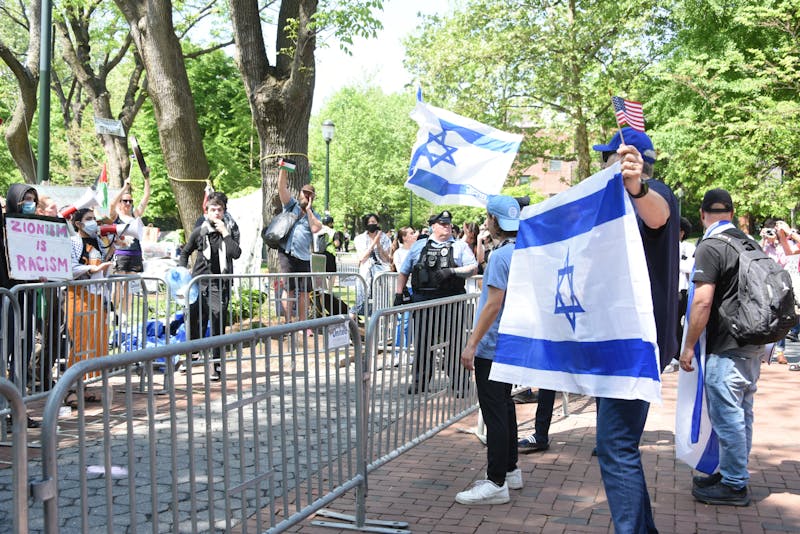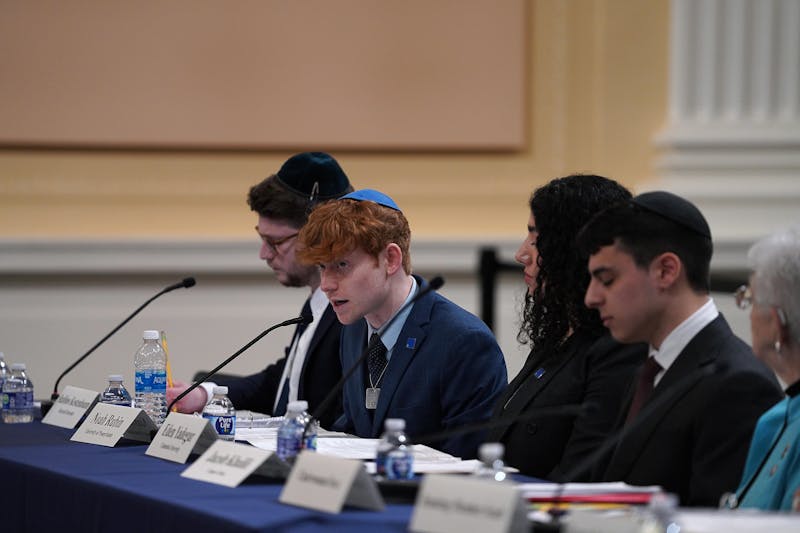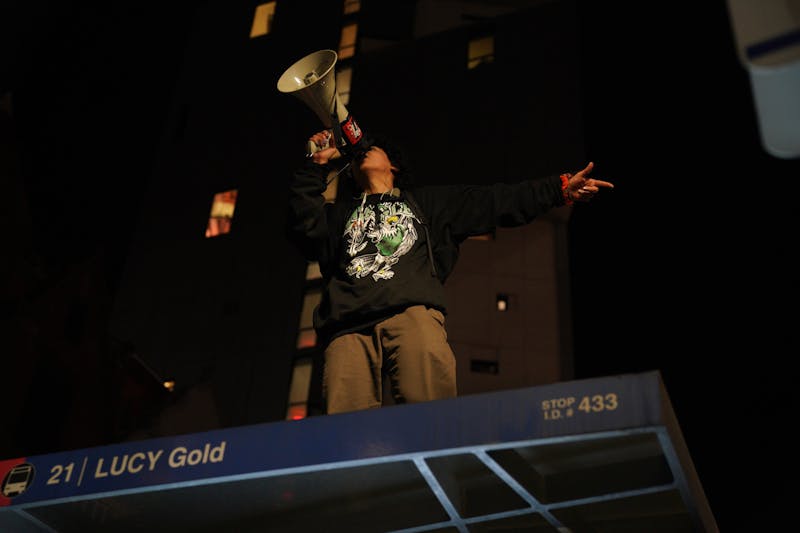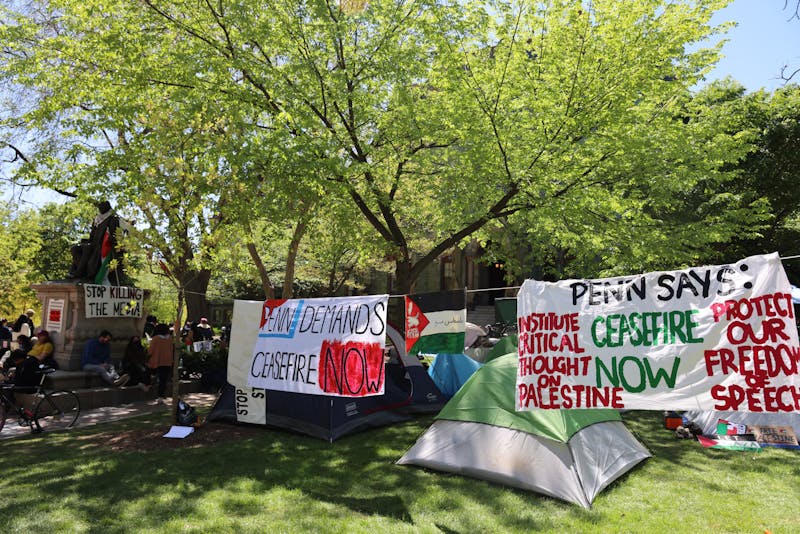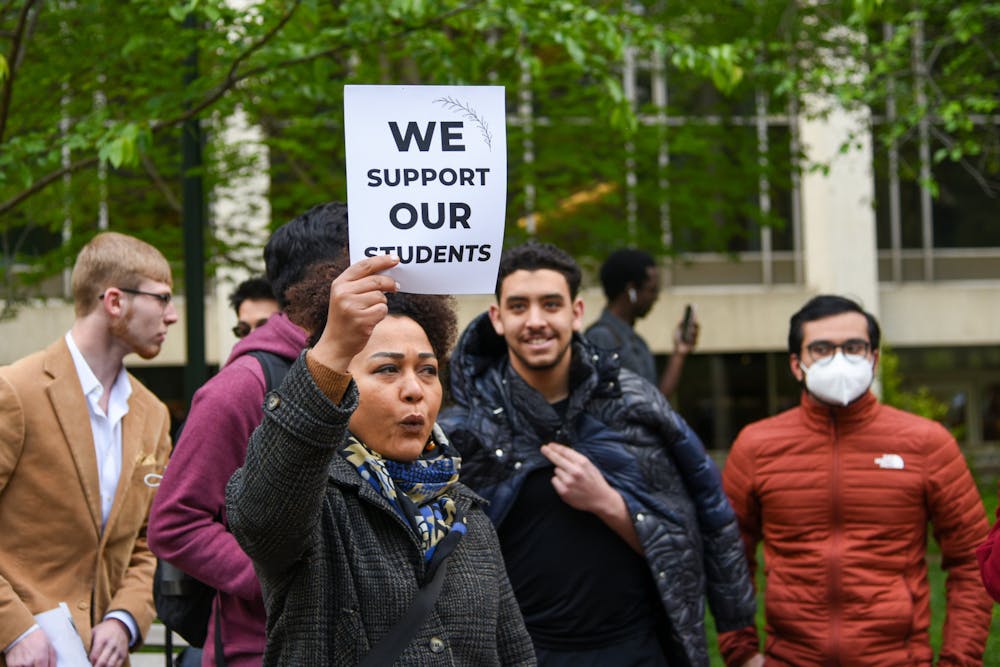
I am an international student from Kuwait — but many assume that I am American upon first meeting me. I have an American accent, tattoos, piercings, and no particular explicit indication of my identity as an Arab man; I do not wear a necklace in Arabic, and I have never worn Arab cultural attire around campus. So, why is it that I constantly have an opinion thrust upon me regarding campus protests and Israel-Palestine as a whole?
Please do not misunderstand me as selfishly complaining or not wanting to engage in political discourse. I bring this to light to convey that even I, as relatively non-Arab presenting as I am, have not been spared the Penn community’s blatant and upsetting racial profiling. I have lost count of how many individuals — ranging from peers to distant acquaintances to strangers — that I have met who assumed my position on the Israel-Palestine conflict or that I was even Muslim since the escalation on Oct. 7.
Of course, it is arguably normal for an individual to make harmless assumptions based on observations. But the issue arises when these assumptions, as often occurs at Penn, become the basis for stereotypical and hateful rhetoric. I study Hebrew at Penn, and other students have always asked me if I feel “angry” or “upset” in class when a discussion centering around Israel or Zionism arises. And therein lies one of the issues: Arab students such as myself are not asked for their positions nor given the benefit of the doubt. We are immediately thrust into a position of aggressive anger and discontent that we never even communicated nor chose ourselves. The notion of the ‘angry Arab’ is rooted in imperial and colonialist mindsets, and perhaps more salient is the distortion of Arab students’ words and intentions — a concept reminiscent of the West’s initial misconstruing of Edward Said’s writings.
I have also found minuscule and dwindling support from the Hebrew department during my studies, with my only alternative to finishing my major requirement — besides a language class that cannot fit my schedule — being a class revolving around Israeli culture. I cannot help but think of the Penn community's outrage had I been a white and/or Jewish student not being supported in their Arabic studies and forced to take a class around Palestinian culture. To be crystal clear, I would not condone the aforementioned happening to any Jewish student, nor do I condone the alleged forceful attendance of Jewish students to the Palestine Writes Literature Festival for their class. A university as well endowed and progressive as Penn can and should provide ample support and resources to both communities; it would be a grave injustice otherwise. But whilst Jewish students who express their fears garnered earned and necessary support from the University, and even testified at Congress, here I am explicitly expressing my concerns for the safety of myself and other Arab students in another column due to the shameful lack of support.
Despite all of these concerns, including the ones voiced in my previous column and the data from the survey I have collected, Penn fails to shed light on the concerns and fears of the Arab community. The Jewish community had the antisemitism task force established as far back as November, and the Arab community received the scraps of a generalized “commission against hate”; I implore us all, regardless of political views and association, to ask why antisemitism is allowed to have the word “task force” attached to it while anti-Arab hate and Islamophobia does not get the same explicit word? Is this not a clear inequality on the administration’s end? And it is not a matter of semantics, as the explicitness of the antisemitism task force conveys its — rightful and valid — importance whilst the generalized “commission against hate” fails to even include the word “Arab” and/or “Muslim” in it, let alone convey the same sense of urgency and action.
The lack of equal task force establishment, both in speed of establishment and in title, is not the only thing that further divides the struggling communities at Penn. The absolute disregard that interim President Larry Jameson and the Penn administration had for Ramadan and Eid is appalling and indescribably discriminatory; not acknowledging these major religious holidays for a community that is already underrepresented and discriminated against during these trying times communicates one thing: that Arab and Muslim students do not matter.
This is only exemplified by the fact that less than a week after Eid, an email was sent out that mentioned Passover and the safety of Jewish students in light of encampments. This does not help support or heal the Jewish nor Arab students but rather continues to widen the chasm that our previous president left behind. Are Arab and Muslim students not equally worthy of safety from potential collateral damage caused by protesting? Are Arab and Muslim holidays not worthy of any mention at all? In fact, just as early as May 1, students suffered a chemical attack while security waited before intervention, and the administration has not acknowledged this matter with the urgency the encampment was addressed with. Comments circulated on The Daily Pennsylvanian’s Instagram coverage mocking the individuals and trivializing the attack by claiming the agent was “fart spray,” and a counter-protestor was caught with two knives and walked off with only a citation.
Even more vitriolic and direct hate-speech that weaponizes the ‘terrorist’ rhetoric was espoused by alleged Penn community members towards Arab students on May 5; protestors at the encampment were awoken with a mocking of the Muslim call to prayer and were directly called “terrorists,” a blatant Islamophobic and anti-Arab notion that harms community members not involved in the encampment and protests. None of the aforementioned has been addressed by Jameson in his volley of emails, further proving Penn’s lack of support for Muslim and Arab students. Again, I cannot help but think of the Penn community's outrage had this happened to any of the pro-Israel counter-protestors who were also exercising their First Amendment rights.
I have heard the concerns and fears of my Jewish peers, and I am hurt by the thought that students within the mainstream Jewish community have to feel fearful no matter the reason or tangible validity of it. I have attended different seders over Passover, I have co-hosted dialogues to foster understanding, and I will continue to do so and grow my understanding and empathy. But I have mostly been asked if my friends and I — as Arab individuals — fear daily life on campus by Arab professors and by friends abroad, rarely by other groups of individuals. So, as a closing note, I beseech all readers to check in on and comfort your Arab peers — and when their fears and sorrow transform into anger and action, consider all that they have endured and the absolute lack of support before labeling their anger and emotionality as ‘irrational, ‘scary,’ and ‘violent.’
FARESI ALFARESI is a College junior studying political science and modern Middle Eastern studies from Kuwait. His email is alfaresi@sas.upenn.edu.
The Daily Pennsylvanian is an independent, student-run newspaper. Please consider making a donation to support the coverage that shapes the University. Your generosity ensures a future of strong journalism at Penn.
Donate




